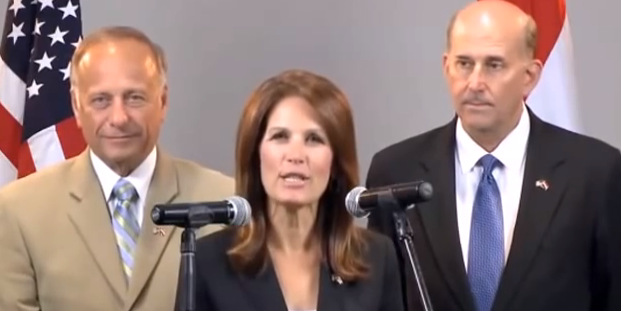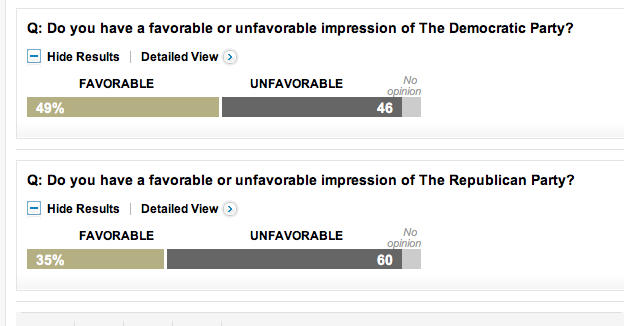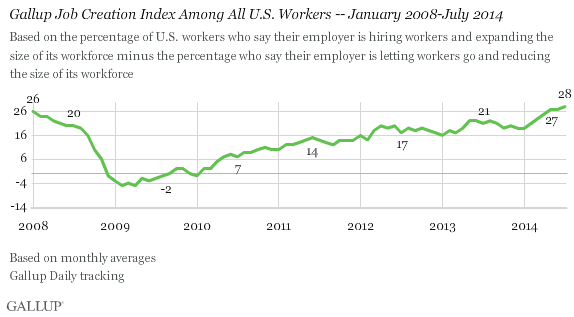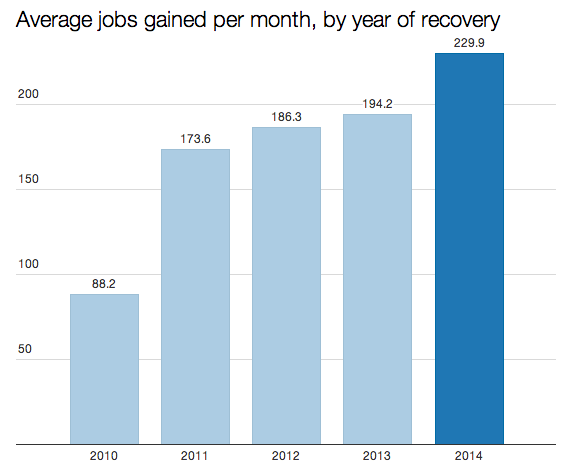People don’t love Democrats but they hate the alternative

Many the members of the GOP’s House majority have literally have had their districts drawn for them. And if Republicans wanted to draw a map that would give them a chance to take control of the Senate, it would look exactly like what we’re seeing in 2014.
The party of Steve King, Michele Bachmann and Louis Gohmert simply needs to win six seats to take the majority of the upper house of Congress and Democrats are defending seven seats in states that Mitt Romney won as he lost in a landslide. They will likely pick up Montana, South Dakota and West Virginia easily. If the party wins three seats that are up in Alaska, Arkansas, North Carolina and Louisiana, Mitch McConnell will become majority leader — as long as he doesn’t lose his seat.
The map isn’t the right’s only advantage. Festering crises in Iraq, Israel, Syria and Ukraine along with the child refugee swell have shaken President Obama’s foreign policy ratings. Regardless of circumstances, voters also tend to reject a president’s party in his sixth year. Also, the voters who come out in midterm elections tend to be older, whiter and Republican-er.
So what are the GOP’s chances of pulling off the very non-Herculean feat of taking the Senate?
About 54 percent says The Upshot. FiveThirtyEight puts the odds at about 60 percent.
I’d say it’s a flat 50/50. Why?
Republicans suggested they have a chance to pick up Senate seats in Colorado, Michigan, New Hampshire, Iowa and Virginia. But as voters in those blue states have taken a look at their candidates, those chances have begun to shrivel.
Democratic candidates are leading in Alaska and North Carolina, slightly. And they’re very competitive in Arkansas and Louisiana while two strong Dems are running neck and neck in Kentucky and Georgia.
To be clear, the GOP doesn’t need a wave to take the Senate. It just needs not to set on fire the gift it’s been given.
But here’s why no one should expect 2014 to resemble that massive landslide of 2010.
1. Republicans are incredibly unpopular.
If there are two words that sum up why there won’t be a GOP wave this year, they would be House Republicans. Or, perhaps, Speaker Cruz.
The latest NBC News/Wall Street Journal Survey shows that in general people are pessimistic and unhappy with their leaders. But they’re far more unhappy with the Republicans in Congress than anyone else, except Vladimir Putin. They’re more than twice as unpopular as Democrats and five times more unpopular than the president.

The latest Washington Post also found that the GOP is far less popular than Democrats.

I’ve pointed out that the border crisis may improve the Republicans’ stature briefly as nativist instincts flare. But even that has costs.
2. The economy is really improving.
In that same NBC News/Wall Street Journal Survey that showed the president’s popularity at an all-time low, he received slightly higher marks in his handling of the economy. Also, fewer people said that they thought America was in a recession than at any time since September 12, 2001. And what people are reporting is evident in other indicators.
In the each of the last three months the economy created more 200,000 jobs, with nearly 300,000 jobs in June. This has us on pace for the best year of job creation since 1999.
Gallup reports that in July we experienced the best job creation in six years.

We can’t say if this will continue but we can say what the economy won’t look like in 2014 — 2010.

People forget that 2010 was the absolute nadir of the Great Recession. Though economists overwhelming agree that the Stimulus was a success now, it was impossible to make that case as we teetered on the verge of a Greater Depression.
3. Keeping and improving Obamacare is far more popular than repealing it.
Another huge advantage the GOP had in 2010 was that Obamacare had just become law. Democrats had to run on all the controversy and none of the benefits.
In June, it seemed the president’s signature health law was finally becoming more popular. But it’s popularity dipped again in July. Any problem with our health care system, which is still largely the same unruly beast that costs us a trillion a year, is blamed on the law. While the benefits are subtle to the point that they seem designed for people not to notice.
The Washington Post‘s Greg Sargent points out that millions in inflammatory and often baldly false ads have made no dent in people’s stance on the law, as the uninsured rate has dropped by about 25 percent. No matter how unpopular the law becomes, repeal remains about half as popular as simply keeping the law and fixing it.
People don’t love it but they hate the alternative, which is the story of the 2014 election.
That’s why the GOP is threatening to blow its third straight chance to take the Senate and possibly even setting up Democrats for another chance of securing a filibuster-proof majority in 2016.



